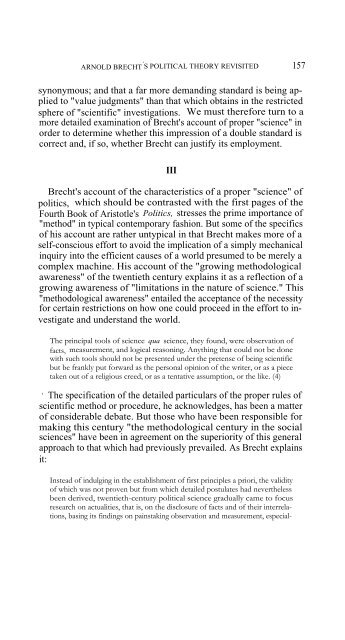ARNOLD BRECHT'S POLITICAL THEORY REVISITED Political ...
ARNOLD BRECHT'S POLITICAL THEORY REVISITED Political ...
ARNOLD BRECHT'S POLITICAL THEORY REVISITED Political ...
You also want an ePaper? Increase the reach of your titles
YUMPU automatically turns print PDFs into web optimized ePapers that Google loves.
<strong>ARNOLD</strong> BRECHT ' S <strong>POLITICAL</strong> <strong>THEORY</strong> <strong>REVISITED</strong> 157<br />
synonymous; and that a far more demanding standard is being applied<br />
to "value judgments" than that which obtains in the restricted<br />
sphere of "scientific" investigations. We must therefore turn to a<br />
more detailed examination of Brecht's account of proper "science" in<br />
order to determine whether this impression of a double standard is<br />
correct and, if so, whether Brecht can justify its employment.<br />
III<br />
Brecht's account of the characteristics of a proper "science" of<br />
politics, which should be contrasted with the first pages of the<br />
Fourth Book of Aristotle's Politics, stresses the prime importance of<br />
"method" in typical contemporary fashion. But some of the specifics<br />
of his account are rather untypical in that Brecht makes more of a<br />
self-conscious effort to avoid the implication of a simply mechanical<br />
inquiry into the efficient causes of a world presumed to be merely a<br />
complex machine. His account of the "growing methodological<br />
awareness" of the twentieth century explains it as a reflection of a<br />
growing awareness of "limitations in the nature of science." This<br />
"methodological awareness" entailed the acceptance of the necessity<br />
for certain restrictions on how one could proceed in the effort to investigate<br />
and understand the world.<br />
The principal tools of science qua science, they found, were observation of<br />
facts, measurement, and logical reasoning. Anything that could not be done<br />
with such tools should not be presented under the pretense of being scientific<br />
but be frankly put forward as the personal opinion of the writer, or as a piece<br />
taken out of a religious creed, or as a tentative assumption, or the like. (4)<br />
' The specification of the detailed particulars of the proper rules of<br />
scientific method or procedure, he acknowledges, has been a matter<br />
of considerable debate. But those who have been responsible for<br />
making this century "the methodological century in the social<br />
sciences" have been in agreement on the superiority of this general<br />
approach to that which had previously prevailed. As Brecht explains<br />
it:<br />
Instead of indulging in the establishment of first principles a priori, the validity<br />
of which was not proven but from which detailed postulates had nevertheless<br />
been derived, twentieth-century political science gradually came to focus<br />
research on actualities, that is, on the disclosure of facts and of their interrelations,<br />
basing its findings on painstaking observation and measurement, especial-
















